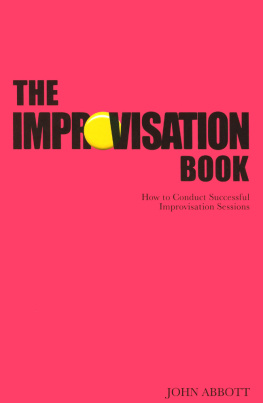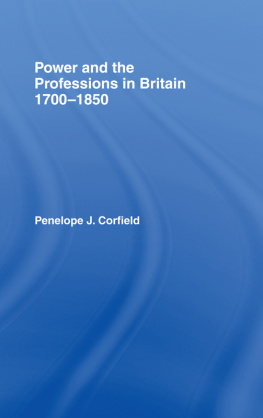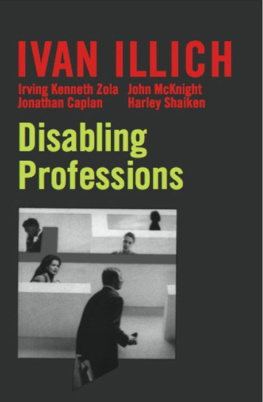The University of Chicago Press, Chicago 60637
The University of Chicago Press, Ltd., London
1988 by The University of Chicago
All rights reserved. Published 1988
Printed in the United States of America
14 13 12 11 10 11 12 13
ISBN: 978-0-226-18966-6 (e-book)
ISBN-13: 978-0-226-00069-5
ISBN-10: 0-226-00069-9
Library of Congress Cataloging-in-Publication Data
Abbott, Andrew Delano.
The system of professions.
Bibliography: p.
Includes index.
1. ProfessionsUnited States. 2. Professions
Great Britain. 3. ProfessionsEurope. I. Title.
HD8038.U5A615 1988 331.71209 87-30206
ISBN 0-226-00069-9 (pbk.)
 The paper used in this publication meets the minimum requirements of the American National Standard for Information SciencesPermanence of Paper for Printed Library Materials, ANSI Z39.48-1992.
The paper used in this publication meets the minimum requirements of the American National Standard for Information SciencesPermanence of Paper for Printed Library Materials, ANSI Z39.48-1992.
The System of Professions
An Essay on the Division of Expert Labor
Andrew Abbott

The University of Chicago Press
Chicago and London
For My Parents and in Memory of W. G. Abbott, Jr.
Contents
Preface
On a brave spring morning in 1973, I sat with two psychiatrists in the office of John R. Collier, superintendent of Illinoiss Manteno State Hospital. After a year observing the use of psychiatric knowledge in an outpatient clinic, I was now ready to analyze the stranger world of the mental hospital. Friends had introduced me to David Turner and David Klass, consultant specialists at Manteno, the great chronic hospital that anchored the Illinois state mental health system. The place overwhelmed me. Dozens of ward buildings covered a square mile of prairie. So regular was their formation that when we had passed beside the northernmost ward on the way to the administration building, I had seen through its porch arches the concentric outlines of equivalent arches on ward after ward to the very end of the hospital. While Collier read my little letter of intent, I looked out at the briskly snapping state flag and thought of Foucault finding in those arches the triumph of regularity and order. Turner and Klass joked quietly. Finally, Collier glanced up. I dont see why you need to go on the wards to study psychiatric knowledge, he grinned. All the psychiatric knowledge in this hospitals sitting right here in this room.
I was later to see what Collier had meant. To care for its 3,500 patients, Manteno employed only one board-certified psychiatrist and indeed only three or four licensed physicians. Most medical care was performed by unlicensed foreign doctors, who were at that very moment dreading the brand-new Federal Licensing Examination. Turner and Klass, by contrast, had both been chief residents at the University of Chicago; in an official sense, they and Anne-Marie Rohan, the one board-certified staff member, did indeed possess all the psychiatric knowledge in the hospital.
In an official sense.... What is it to possess and control expertise? After five years at Manteno, I had spent more time with mental patients, seen more of their activities, and endured more of their jokes than most psychiatrists do in a lifetime. I had lost pool matches to manic-depressives and poker games to schizophrenics. I had dodged clutching fingers that had killed four less-agile people. I had conversed with an elderly man who lived what Wittgenstein wrote. I had helped administer several tons of thorazine, mellaril, and their cousins, and the pounds of cogentin and artane to control their side effects. Yet, in an official sense, five years at Manteno did not make me an expert on the insane.
They did, however, make me wonder why I was not. I went on to write a thesis on psychiatry as a profession and then began to consider the general issue of how modern societies institutionalize expertise. I knew that the common form of that institutionalization was professionalism. Many writers had studied professionalism, but few, I felt, studied the basic conditions and contexts of the control of work. Most studied the organization and affiliation of practitioners, and, for most, professionalism was either a phenomenon happening to individual professions or a grand sea change in the occupational system generally. There was in this work little sense of the squabbles between the Manteno psychologists and social workers over who could interpret diagnostic tests, of the war between our attorneys and our doctors over the patients who were incompetent to stand trial, of the vast distance between Klass, Turner, and Rohan on the one hand and the foreign ward doctors on the other. Of course, all of these problems had been studied individually. But with the exception of some work by Everett Hughess studentsparticularly Eliot Freidson, Rue Bucher, and Anselm Straussthere was no theory about them. There was certainly no attempt to see these interprofessional battles as central aspects of professionalism, rather than as isolated movements and pathologies.
In typical Chicago fashion, then, this book grew out of my experiences as a participant observer. That the books evidence is mostly historical should not obscure its fieldwork origins. My Manteno years, and the clinic year before them, forced me towards a theory that could reconcile the historical continuity of professional appearances with the day-to-day discontinuities of professional reality. I experienced this disjunction quite personally. Manteno psychologists eagerly participated in their professions war with psychiatry, actively lobbying for third-party payment. Yet their everyday professional world was so insecure that they protested in vain when administrators placed my uncertified self into the civil service psychologist classification.
Yet these local vicissitudes reflect larger reality, and a serious theory of professional development must embrace and explain this larger reality as well. Mantenos professionals struggled within a historical environment of peculiar intensity. Deinstitutionalization of mental patients was in full swing, destroying professionals jobs as it fulfilled their ideologies. Biological psychiatry was rapidly recouping the doctors position against the counseling professions, although token economies were making a substantial counterattack. Within the counseling area itself, psychoanalysis was at last losing its monopolistic dominance, and the flood tide of nonmedical psychotherapy beginning to flow. It was a time of great hope and change.
Yet the prevailing feeling of the hospital was of decline. Around us stood mute witnesses to the death of the asylum. When I stayed at the hospital on summer evenings I would walk at sunset past rank on rank of empty wards, past swings and seesaws unused for decades. The thousand-acre hospital farms had been rented to sod and corn farmers. The great southern lawn had become a public golf course. The diesel switching engine stood idle by the power plant, behind the empty kitchens that had once fed ten thousand persons a day. Beyond the power plant, the railroad siding snaked two weedy miles towards the Illinois Central tracks, passing an orchard where a few hardy trees still produced worm-eaten fruit. On such an evening, the whole history of the asylum hospital gleamed on the signs naming the wardsthe idealistic founders Pinel and Dix, the famous Europeans Kraepelin, Freud, and Adler, the great Americans Rush, Meyer, and Mitchell. There were buildings, too, for other professions important to the asylum hospitalBarton and Nightingale for the nurses, Addams and Wines for the social workers, James for the psychologists. If I have captured in this book a sense of professions transiency, it owes much to this experience of the dying hospital.
This book, then, aims to show the professions growing, splitting, joining, adapting, dying. The objects of its analysis include a wide variety of professions in the United States, England, and, to some extent, France and the other nations of continental Europe. I have been catholic in my tastes, trying to offset the customary reliance on American law and medicine. (I have generally avoided writing about academic professions, hoping to escape charges of navel gazing from nonacademic readers and the sense of we-know-it-all-already among academics.) The breadth of examples requires the usual disclaimer a synthetic writer makes to area specialists. Few of these analyses other than those in my own primary research areas will seem sophisticated to specialists on individual professions. I have done my best in unfamiliar territories, but doubtless many minor errors remain. On the other hand, that I write such a book testifies to my belief that synthesis will prove more worthwhile than further area work. Readers can judge for themselves whether that belief is correct.
Next page


















 The paper used in this publication meets the minimum requirements of the American National Standard for Information SciencesPermanence of Paper for Printed Library Materials, ANSI Z39.48-1992.
The paper used in this publication meets the minimum requirements of the American National Standard for Information SciencesPermanence of Paper for Printed Library Materials, ANSI Z39.48-1992.